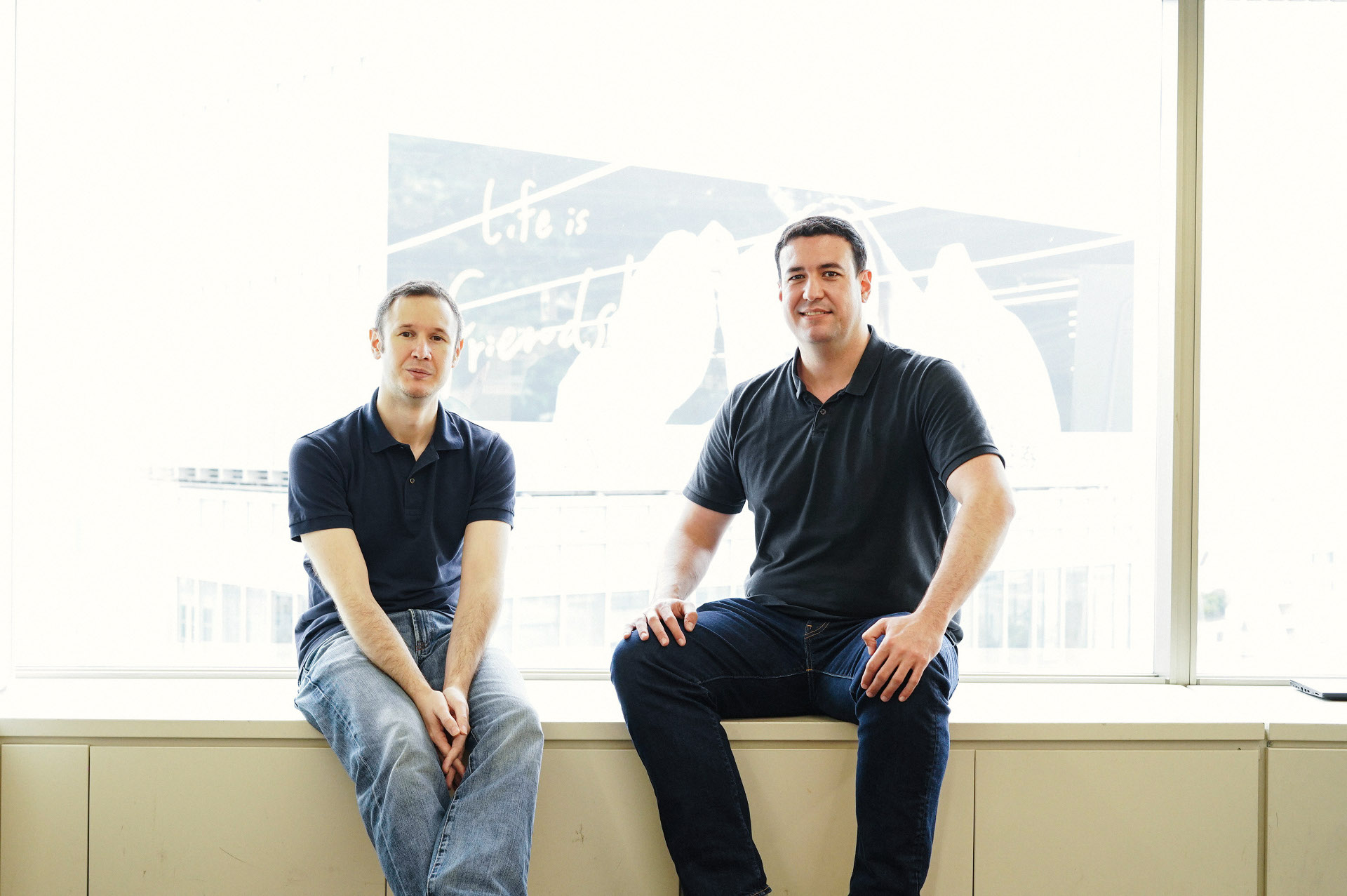
profile
Ruben(left)
Sansan Division Product Development Department Global Product Group
After graduating from the University of Barcelona and working as an IT Engineer for 2 years, Ruben came to Japan to learn Japanese. After passing the JLPT N2 exam, he went into the video game industry, where he spent 10 years. Feeling like he needed a change, and wanting to work with a more international team, he joined Sansan in 2019.
Guilherme(hereinafter referred to Guil.right)
Sansan Division Product Development Department Global Product Group
Guilherme has been a software engineer for 10 years, working in various industries; from supermarket focused ERP, to helping mechanical engineers run CFD simulations on the cloud. Originally from Brazil, Guilherme moved to Germany to seek international business experience. After working there for 2 and a half years, he joined Sansan in 2019.
Finding New Opportunities in Japan
Please tell us about your background.
Guil:I majored in computer science in my home state in Brazil. After that, for about six or seven years I did software engineering work in Sao Paolo across the public and private sectors, from government and police offices, to the retail industry.Then I moved to Germany because I was looking to have international experience outside Brazil, improve my English skills, and work with engineers from different places around the world. I worked for two-and-a-half years at a small start-up in Munich where I helped to develop a system to help mechanical engineers run their simulations on the cloud.
Ruben:I graduated from Barcelona University when I was 21 years old. With that, I felt that I had done what I had to do – study at a university and get my degree. After that I just wanted to experience something new. I had some Japanese friends and other Spanish friends who wanted to come to Japan and eventually I came to Japan to study Japanese for one year. At first, my goal was to study one year and then go back to Spain, but during that one year, I found I liked Japan a lot and wanted to study a little bit more, so I studied for another six months.
After that I got a lot of good job offers because of my degree. I started working at a small company, but then the global financial crisis hit and my company went out of business, so I started looking for a new job. I then started working in a field I really like – video games. After ten years of that, I felt like a change; while making games is fun, I wanted to try something else.
I found Sansan and I saw that it was a very good company, doing some new stuff, and had a global team or was at least looking to expand overseas. Like Guilherme, I was looking to work with foreign people and see people with different types of mentality and background. Now I am at Sansan, enjoying what I do and very happy to be working with people like Guilherme.
Have you encountered any difficulties while working in Japan?
Guil:I will have completed a year at Sansan in August and, so far, I have only had good experiences. When people talk about working in Japan, you sometimes hear stories about long working hours or demanding bosses, but I’ve not experienced anything like that. Everybody treats me well and I have support from the company. The office is really cool. Even in a time of crisis like now, everybody is being supportive and working from home. But that is just my experience. I have not been here very long, certainly not as long as Ruben.Ruben:This is my 14th year in Japan. I’ve also heard about people working too much and other stories, but I’ve never worked long hours. I have always explained my case, which is that you work 7 or 8 hours, and then you need to take the time to rest and be back at 100% the next day. You need to have energy to do your best. That is something I explained. My last company understood that and so does Sansan.
My experience in Japan has been great. The food is good, people are nice, and there are opportunities here. Japan is one of the best countries I have ever been to. I love it here and plan to be here until I retire.
Bringing Global Ideas to Sansan’s Products and Work Processes
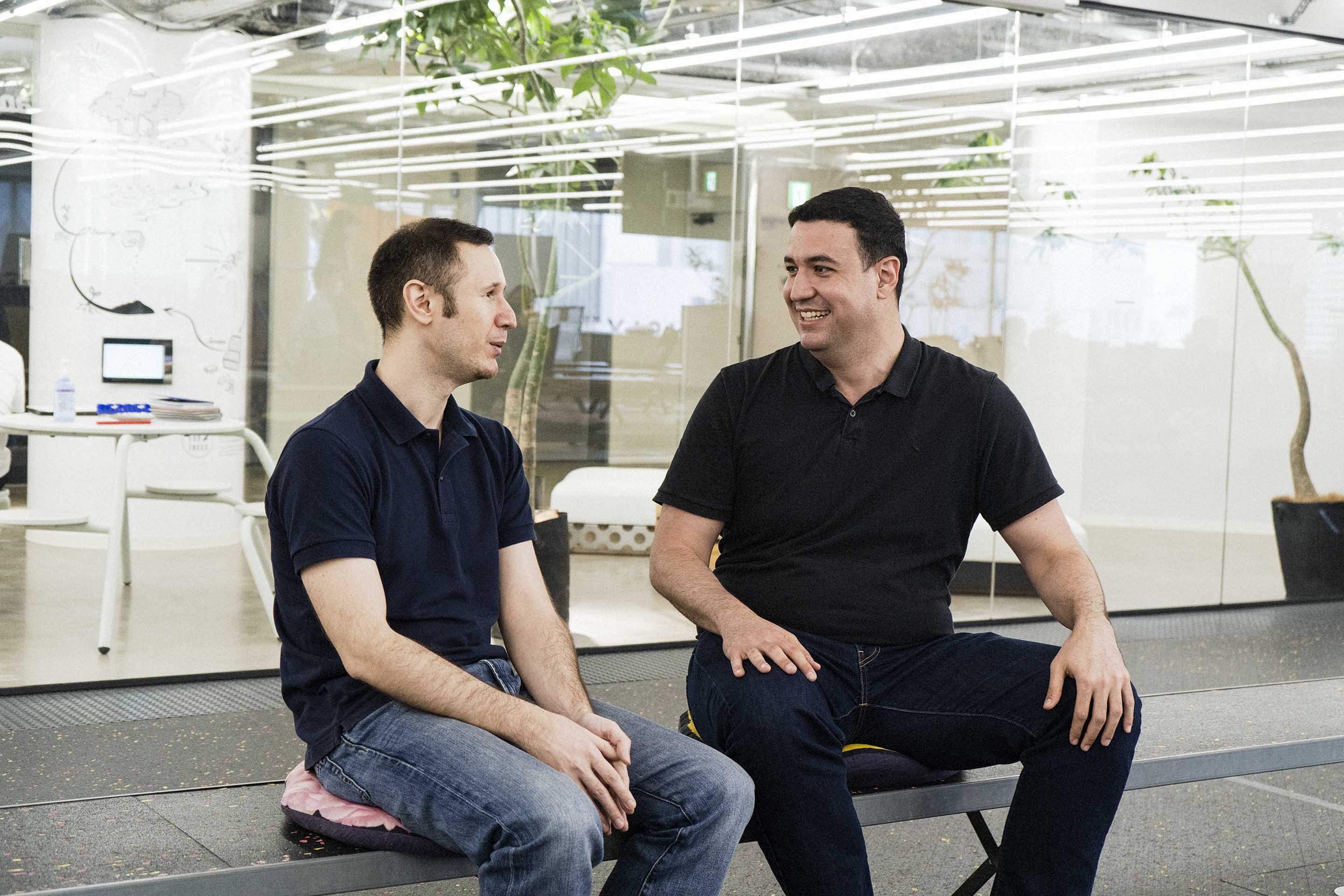
What is the mission of the Sansan Global Product Group?
Guil:The way I usually explain it is that our team is responsible for dealing with the feedback and all the demands that come to us, mostly from the Singapore branch. We improve the product for those users outside Japan – localization, time zone issues, etc. Now we are improving UX features or adding new integrations that customers in Singapore think are useful.In future, as we expand to other countries, the Global Product Group’s mission is to support that expansion by evolving the product as necessary. The product was made a long time ago with the Japanese market in mind; using Japanese language, Japanese addresses and Japanese business cards, so there are a lot of improvements that we can make to the product to make it a global one.
Ruben:My answer is more or less the same. We are trying to adjust our product for overseas markets. They demand different things, the way they think is different, their industries are different, and we have to adapt everything we have to those markets. In short, we do everything we can to help overseas companies use Sansan in the best way they can.
What about your own mission or projects?
Guil:As software engineers, we plan tasks and develop them together with the product managers and the group manager. The current project we are working on is Microsoft 365 integration, which involves syncing Sansan contacts to Outlook contacts.Ruben:Guilherme and I work together, so my answer is mostly the same, but I would add that we are trying to hire more people and improve performance by making it easier to work and making changes that we think need to be made, not only within the team but also as part of some Sansan processes. Our team has people with a range of backgrounds so we might think a little differently and know that there are some other ways to do development. In that sense, we are not only working on projects but also on the way we work.
Guil:That’s right. I came from a smaller company where I had a lot of responsibility and more freedom to just make decisions or come up with new ideas. There was a bit of a culture shock when I moved to a big company like Sansan, but I am still able to propose new ideas and processes, and, overall, people in our team are very receptive to our ideas. We are also trying to scale those ideas outside the team but that can be more challenging, because we need to convince other project managers and other team leaders to change their processes as well.
What future challenges would you like to take on at Sansan?
Guil:I would like to be closer to our customers, maybe even travel to Singapore at some point. I would like to be more aware of the business part of our company, not only the technical part. I don’t know when or how it will happen, but it would definitely be nice.Ruben:One of the goals of Sansan, which we share in our team, is to make Sansan a business platform. We want to expand our business beyond just being an administrative tool. That is a challenge that I would like to be involved in also.
Good Memories with Supportive Colleagues
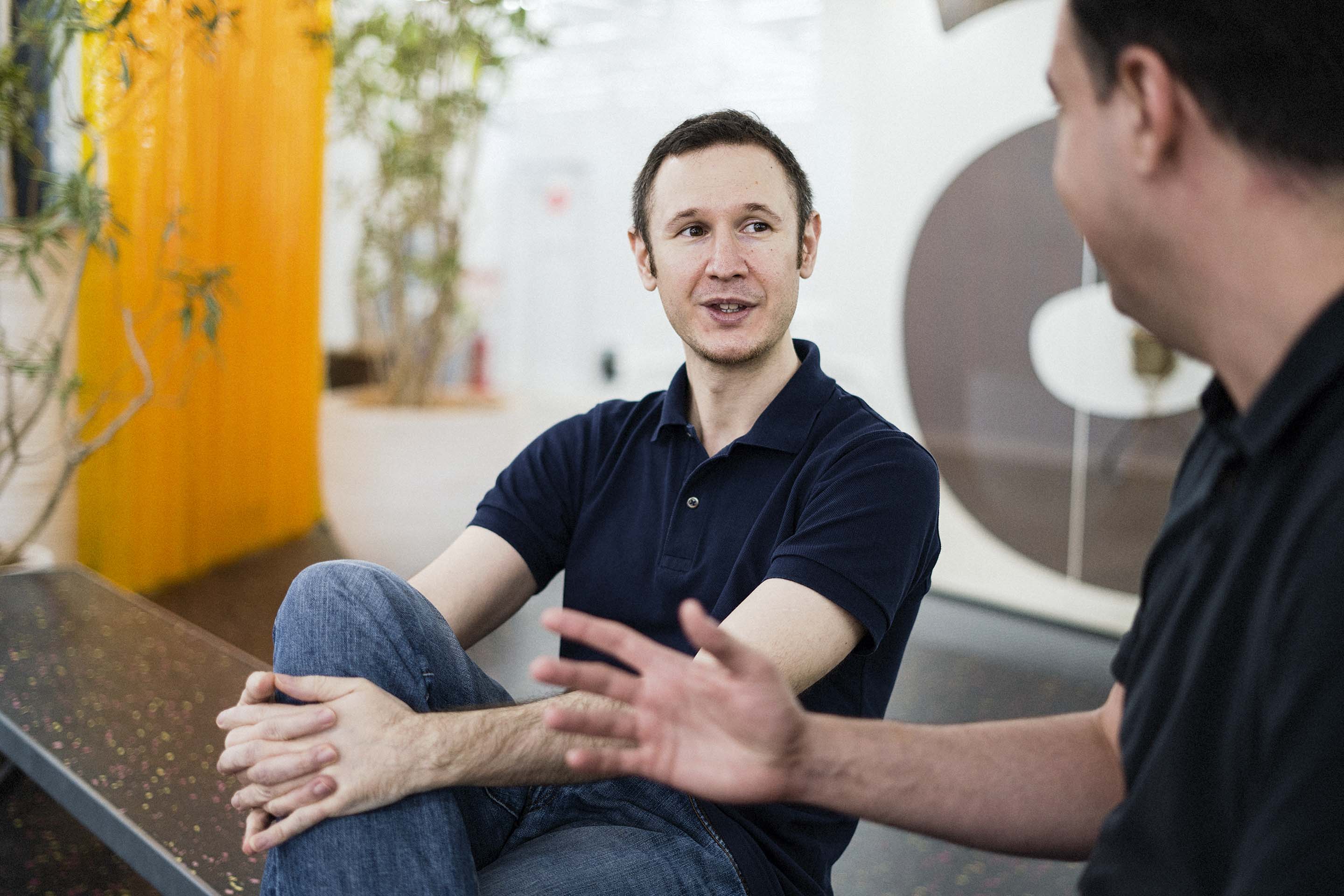
What has been the most memorable moment so far during your time at Sansan?
Guil:Last year, they asked me to dress up as Santa Claus for an event for colleagues with children. It was really, really fun. All the kids loved it. I gave presents to everyone and the children all told me “Merry Christmas!” I am looking forward to doing it again this year, if I have the opportunity.Ruben:I don’t have any single most memorable event. I am a very social person, so I enjoy being with other team members, such as going for drinks or just having dinner together. Every day, doing something fun with your coworkers or just enjoying time together is something memorable for me. You work 8 hours a day and you need to enjoy that time. Spending time with our team or even people from other teams is the best time I have at Sansan. Of course, we need to do our tasks and our projects, but working with people is, for me, the best thing at Sansan. I’m reminded of that every day.
Have there been any tough moments?
Guil:Not really but I remember it was really embarrassing trying to introduce myself on the first day of work in front of the whole auditorium. I was the first foreigner at the company that didn’t really speak Japanese, but it was fun. I said my two sentences in Japanese and everyone was really welcoming.Ruben:Yeah, the first day is probably the toughest day, because you don’t know anyone yet and you’re nervous. That is the only tough time I can think of. I have been in Japan for some time and I can speak some Japanese, but it is not perfect, so I get nervous when I talk in front of a lot of people like that, because I don’t want to make any mistakes. Otherwise, I have not had any bad experiences.
A Close Team with Strong Interpersonal Relationships
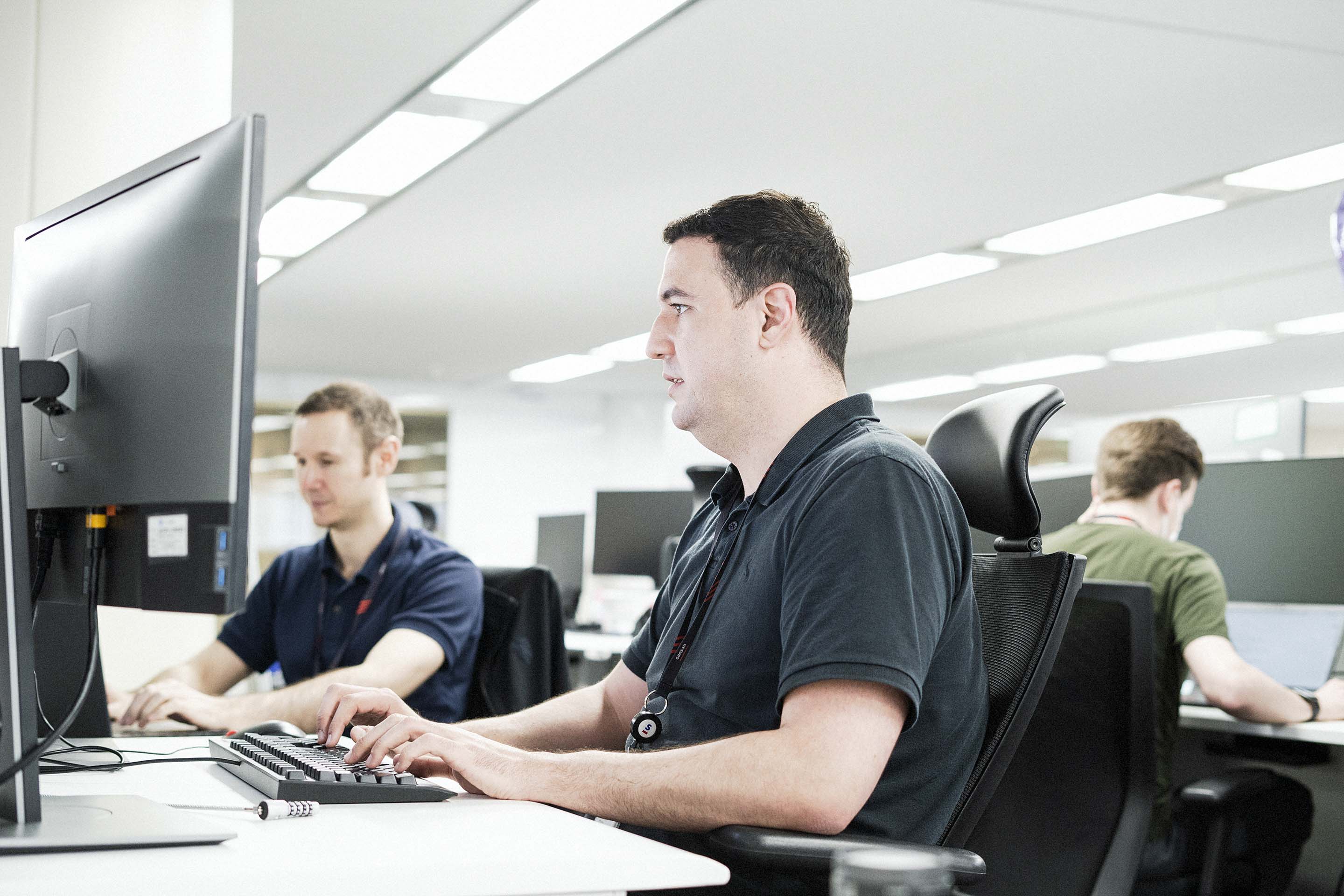
How is the atmosphere in your team?
Guil:At least before the coronavirus outbreak, our team would always go out together for lunch or on Friday night. Our team is always together, not only during our tasks or working hours. Our interactions with the team in Singapore are not that frequent but they are always very nice. We had an end-of-year party with them. It is great to see the results of our collaboration and how our work here impacts their work there.Ruben:Yes, the atmosphere is very good. We also care about team building and relationships. It is important also to have fun. Of course, you do your work and try your best, but you also need to spend time with your team members and have fun. You don’t need to be so serious all the time. You can talk together, go have lunch, go have drinks after work, play some board games, etc. I always try to plan things like that. I think it’s important to include activities like that in the team.
In my opinion, if you get on very well with your team members, you will do a much better job. The atmosphere will be better, and you will go to the office with a lot of energy. I think we are succeeding. Everyone is nice. We are young, we have a lot of energy, and there are many challenges we want to take on.
Have there been any challenges or problems?
Guil:There have not been any problems in terms of team atmosphere. I think the only problems we have are the standard problems of software engineering projects in general. That is not specific to our team or Sansan. For example, a project gets delayed because it was more difficult than we expected, but that is just a constant issue in the software industry. I have not been in any company that doesn’t have those issues.Ruben:Maybe there is one challenge, which is communication. We mainly work in English, but we have a mixture of Japanese and non-Japanese team members, with different levels of English and Japanese language ability. Sometimes, that creates difficulties communicating. I understand that and we are trying to improve the situation. Everyone is doing their best. This is not something we can fix instantly, but I believe the situation will be much better by next year.
How has the coronavirus situation affected your team?
Guil:I think it is the same as other teams. If you are sitting next to each other it is faster to get in sync about a project or to ask a quick question and get feedback fast. Getting answers from Slack or making calls and sharing screens is a bit more troublesome. But this problem is not limited to our team.Ruben:I am thankful that we are able to work remotely. As Guilherme said, it is not the same as working in the office, but we can still work on our projects and do our tasks. It has not been such a big problem. Guil:I think Sansan was well prepared.
A Positive Environment Where Everyone Can Contribute
Sansan values personality and cultural fit, not only skills and experience. Do you agree?
Ruben:I agree 100%. That is something I learned when I was managing a restaurant, before becoming a software engineer. You can divide it up into personality and skills. People’s personalities don’t really change. Skills, people can learn. Existing skills are not that important if someone is a good person, has a positive attitude, has a lot of energy, and is optimistic. I think that is very important. Everyone can learn. For me, it is very important to find people who want to work with other people and want to contribute.Guil:I agree with everything that Ruben said. I interview job candidates and I have met some people who have a good background and experience, but their motivation for joining the company or the way they conducted themselves at the interview didn’t really align with our values. That, for me, and also for other managers, is more important than just a person’s technical background.
I think smaller companies tend to try to find people with a good cultural fit. Even though Sansan is growing fast, it is still a company that people can relate to and where they can feel like they are part of the team. You don’t feel like someone in a mega-corporation doing a job that is replaceable.
What do you think of the evaluation system?
Guil:I have only just had my second evaluation and I don’t really have an opinion yet. It is nice to present your projects and give comments and feedback on other people you work with. We also had 360-degree feedback at my previous companies, but that was more as part of a meeting or for a specific project, rather than a quarterly or semesterly evaluation, as it is at Sansan.However, I would say that, compared to what I have heard about other Japanese companies, where the people who have been at the company longer have the bigger responsibilities and higher salaries, Sansan tries to promote or evaluate people based on their responsibility or contribution regardless of age or seniority. If someone young is contributing a lot, coming up with good ideas, and improving a lot, they can rise quickly. In that sense it is a good system.
Ruben:Like Guilherme, I have also only had a few evaluations, but it is a good opportunity to hear what is expected of you and to share your own comments. That helps you to improve.
The Importance of Global Ideas and Being Open-minded
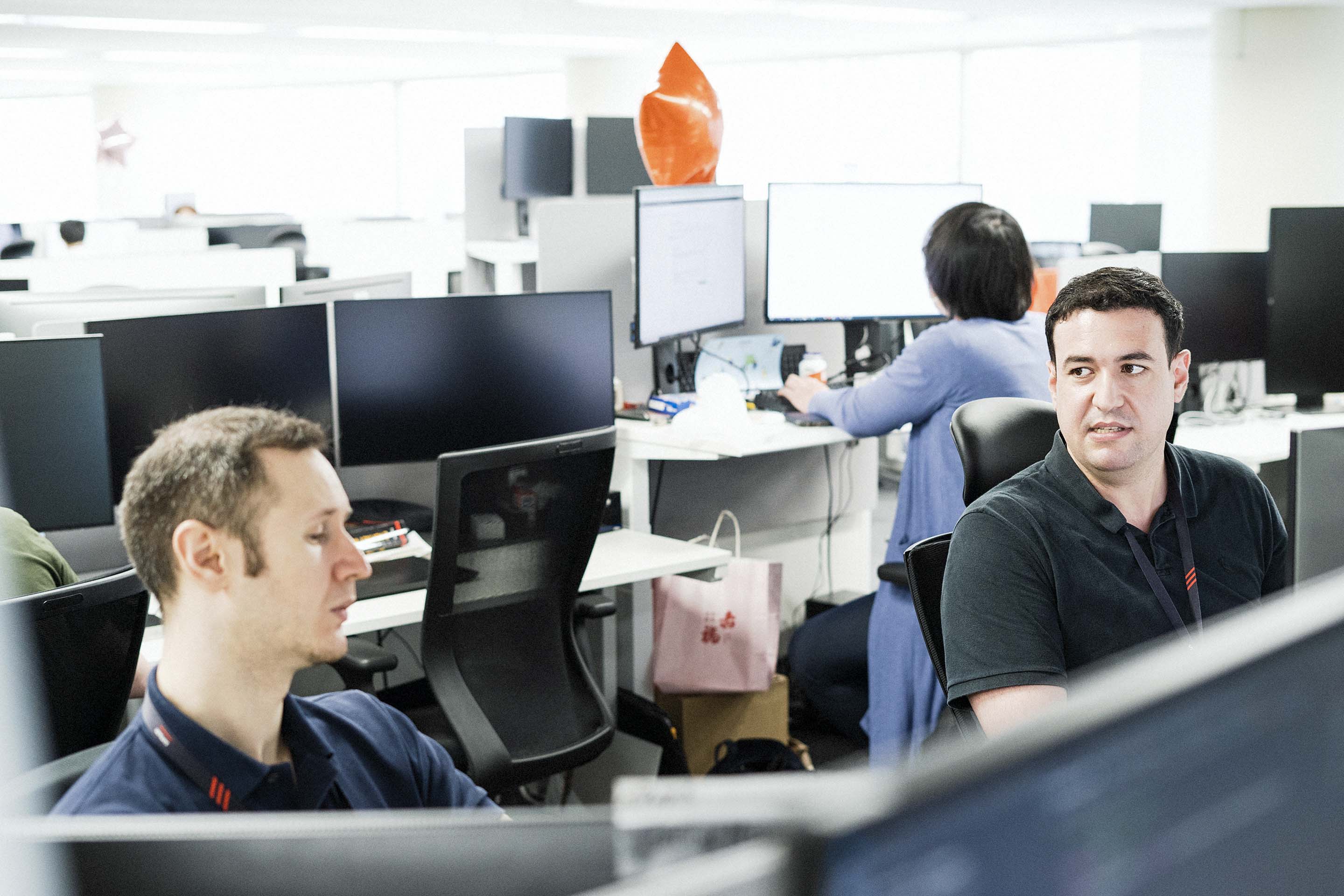
What type of mindset can be successful at the Global Product Group?
Guil:We mostly seek team members with a global background or experience abroad. We want to bring that experience into Sansan and bring in ideas about what products look like outside Japan.To succeed, I think a person would also need to understand a bit about Japanese culture and Japanese work culture, although Sansan is different to most Japanese companies. I think you need to be somewhat open-minded about cultural differences and working in a new country with different people to what you are used to. If you have a tolerant mindset and want to try to do your best, even if things are a little bit different to where you come from, then you can succeed.
I came to Japan already knowing some basic etiquette and how to be polite, what to expect about meetings or schedules, and so on. In some other cultures or countries, there are some things that might not be taken as seriously as in Japan so knowing what those things are really helps. At the same time, we do not want people to just do exactly what they are told to. We want people to have initiative, bring new ideas, and give feedback about the product. That is why we don’t just look inside Japan, but outside as well.
Ruben:I think people should be positive and optimistic. As Guilherme said, those are attributes that people should have to be able to improve. I agree that our team is not one where you just do whatever you are told. It is a team where you give your own ideas and opinions. What we are doing in our team, or at least what I am trying to do, is listen to everyone. I can do something one way, but if someone else suggests trying another way we try that too. If that doesn’t work, we can also try it yet another way. We have done that a few times and I think it works very well.
Experiencing new ways to do things makes you a better person and engineer. I think that is the kind of engineer we want at Sansan – someone who likes doing IT-related tasks and likes working with other people.
Guil:Part of the appeal of coming to Japan and working at Sansan was the opportunity to work in another culture and sometimes in another language. Before joining Sansan, I was told that I would work in a global team, that I would speak English with most of my team members and that I would have support if I had any problems with Japanese. So far that has all been true, but I also enjoy the challenge of having to struggle sometimes with Japanese because I was studying, and am still studying, the language. For me, this is a plus.
I think that is also a mindset that people joining should have. Of course, we want Sansan and the Global Product Group to also succeed only in English, but if someone has the mindset of staying in Japan and at Sansan for a long time, studying the language might be beneficial as well.
The Chance to Join a Unique Team at an Exciting Time
What is the advantage of working at the Sansan Global Product Group?
Guil:We have a pretty unique team in the company. Being able to interact with the Singapore office and to see the growth of Sansan outside Japan as well as how the product evolves from our work is very rewarding. We are about to complete our first year so the team is still just starting up, but I am very excited about what we can contribute to Sansan.Ruben:First, there is the advantage of being able to work with people from other countries. I think that is good for you because it lets you experience different mentalities and cultures, and you will learn things that are useful not just for your job but also for yourself as a person.
There is also the opportunity to do something different to the other teams since we are focussing on the global market, as opposed to the Japanese market. Sansan is expanding overseas and that gives us the opportunity to try to work and think in new ways that are different from what might be the usual way things are done in Japan. It is a challenge, but that is also an advantage if you like doing new things.
Guil:We want to make Sansan a truly global company and if the product grows to the point of selling well outside Japan, which is what we expect, I can imagine we will have engineers outside Japan as well and sales teams in different countries. This could be a reality in a few years and to think that it started because of us and that we contributed to it at the beginning would be a very nice feeling.
interview: Human Resources Department Madoka Kataoka photo: Human Resources Department Jun Takahashi
